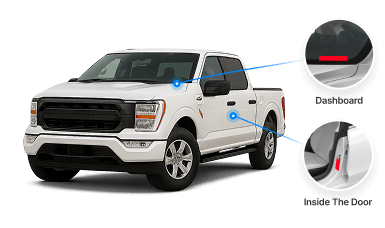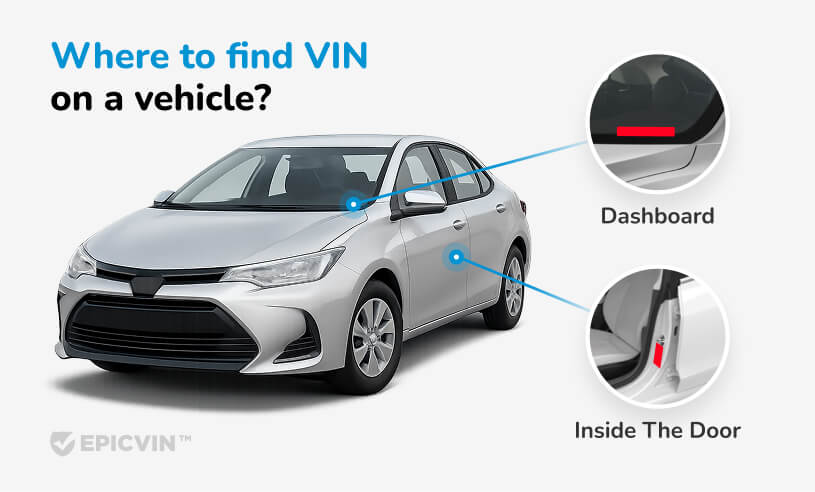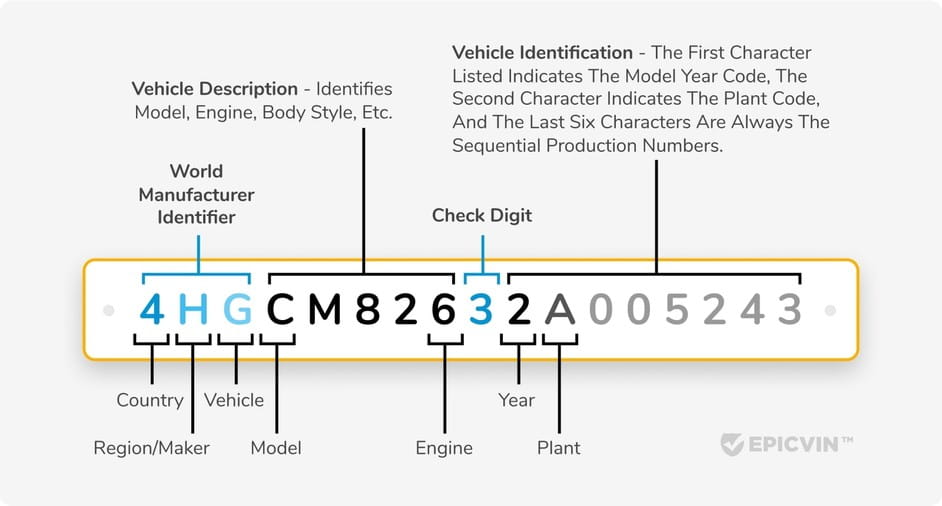
How to Read a VIN Number Like a Pro
From understanding the VIN number breakdown to uncovering a vehicle’s history,...

Free Nissan VIN Decoder! 🚗 See specs, build sheet, recalls basic history—no sign-up. 🛡️✅ Need accidents, mileage, title? Upgrade in one click.
Looking for the VIN?
Here is there you’ll find it:

Every Nissan has carried a unique vehicle identification number (VIN) since 1981. Our tool instantly reveals such a car's fingerprint and helps you make informed decisions. Use our VIN decoder and extract data collected from manufacturer databases, NHTSA records, and insurers.
Our Nissan VIN decoder makes vehicle identification simple and secure. Here's how it works:

Find your vehicle identification number (VIN) in the following places:
| Indicator | Meaning |
|---|---|
| Cars with accident history | ≈ 26% of EpicVIN reports for Nissan contain ≥ 1 damage record (collision, body work, etc.) |
| Salvage/Rebuild title | About 22% of all Nissan vehicles at Copart (1,420 of 6,490 lots, July 2025) sell with salvage or non-repairable status |
| Average mileage | ≈ 110,000 miles for Nissan cars older than 10 years. Sentra and Rogue average 11-12k miles annually |
| Cars with open recalls | Per the EpicVIN database, ~12% of checked Nissan vehicles have at least one unclosed NHTSA or factory recall campaign as of July 2025 |
Check your VIN before purchase. Note that nearly every fourth car has documented damage. Every fifth auction vehicle is sold as salvage.
| Failure | Statistics and Problem Details |
|---|---|
| CVT transmission defect | In 2022, Nissan approved a $277.7 million class-action settlement. The reason – premature CVT failures in Rogue (2014-2018), Pathfinder (2015-2018), and Infiniti QX60 (2015-2018). The warranty was extended to 84 months/84,000 miles |
| VC-Turbo engine failure | June 2025: recall of 443,899 Altima, Rogue, and Infiniti QX50/QX55. It was due to bearings causing power loss and fire risk. 1,878 complaints were registered |
| Wiring harness corrosion (Rogue) | Recall series affected ≈ 814,000 Rogue (2014-2017) – dashboard corrosion can lead to fire hazards |
Tip: Before buying a used Nissan, run the VIN through EpicVIN – the report shows whether the vehicle was affected by these mass campaigns or hides expensive CVT and engine repairs.

Each character in your vehicle's unique sequence tells a specific story. Here's the standard VIN format, uncovering the car's production features and technical specifications:
Here's how our Nissan VIN decoder interprets a sample sequence (JN8AS5MV3BW269745):
| Symbols | Sample | What It Reveals |
|---|---|---|
| 1 | J | Japan as the country of origin |
| 2 | N | Nissan as a manufacturer |
| 3 | 8 | Passenger car vehicle type |
| 4-8 | AS5MV | Body style, engine type, restraint system, model line, and trim level |
| 9 | 3 | Check digit for validation |
| 10 | B | 2011 model year |
| 11 | W | Assembly plant location |
| 12-17 | 269745 | Individual vehicle serial number |
Year 2011
Make Nissan
Model Altima
Fuel Type Gasoline
Engine 2.5L
Made in USA
Our comprehensive decoder reveals essential vehicle details instantly:
Before you snap up a used Nissan, drop the VIN into EpicVIN first. In seconds, you'll see the original build specs, any open CVT- or engine-recall notices, mileage rollbacks, and salvage or lien flags—solid facts that can save you a fortune.Alex Black, CMO & auto expert, EpicVIN
Yes. EpicVIN lets you run a basic Nissan VIN decode at no cost—you instantly see build data such as model, engine type, trim, and assembly plant. You pay only for the full vehicle-history report with accidents and title events.
Enter the VIN number into EpicVIN. Then, review the "Recalls" section. We cross-check Nissan's database and the National Highway Traffic Safety Administration in real time, so open recall campaigns appear with official notice links for free repair information.
EpicVIN decodes every Nissan. This concerns Rogue, Sentra, Frontier, Ariya EVs, GT-R sports vehicles, and the full Infiniti lineup.
Yes. First, enter your valid VIN. EpicVIN displays the factory build sheet. It includes the engine type, transmission, trim, body style, year, assembly plant, and more. You'll know exactly how your specific vehicle left the assembly line.
EpicVIN's free VIN decoder is trusted by vehicle owners, Nissan dealer networks, and insurers because it draws from verified data sources through our website:
– State DMV & NMVTIS feeds – Official branded titles, liens, and odometer readings from motor vehicle records.
– Insurance & collision databases – Total-loss claims and damage reports uncover hidden accident history.
– Major auction networks – High-resolution photos reveal past flood, salvage, or frame damage.
– Nissan & Highway Traffic Safety Administration APIs – Real-time check recalls for open campaigns.
– Service logs – Verified mileage entries expose rollback attempts.
Discover expert tips, news and advice on buying and maintaining used vehicles

From understanding the VIN number breakdown to uncovering a vehicle’s history,...

Here we will tell you everything about 3 deal breakers when buying a car

Here are the most practical cars for older adults, focusing on comfort, safety...